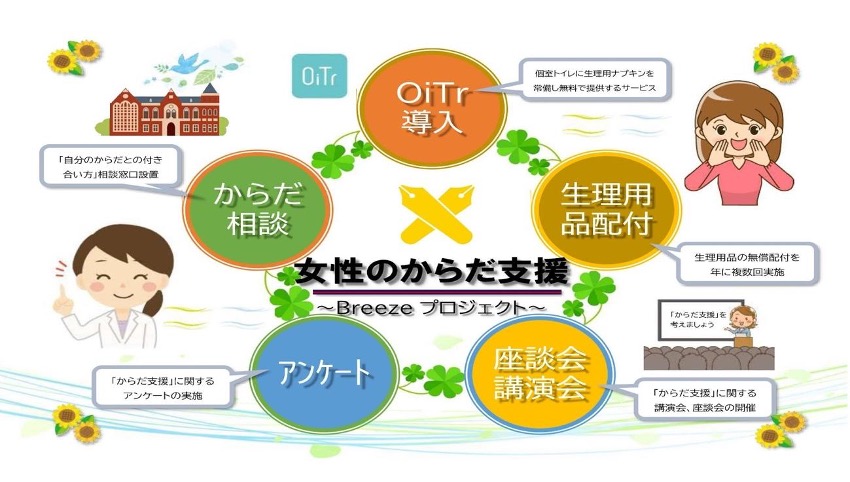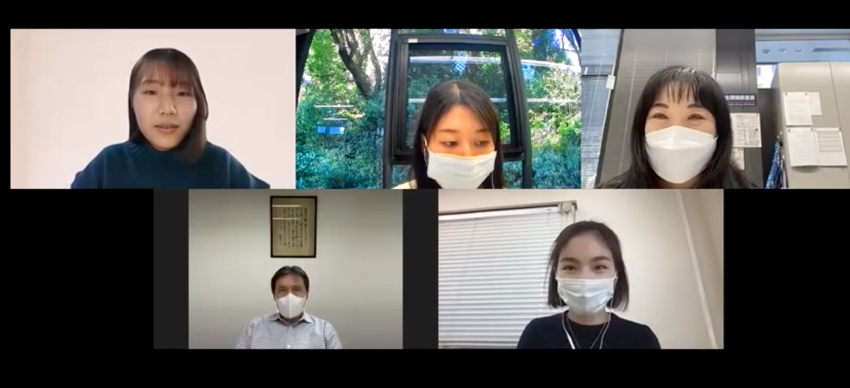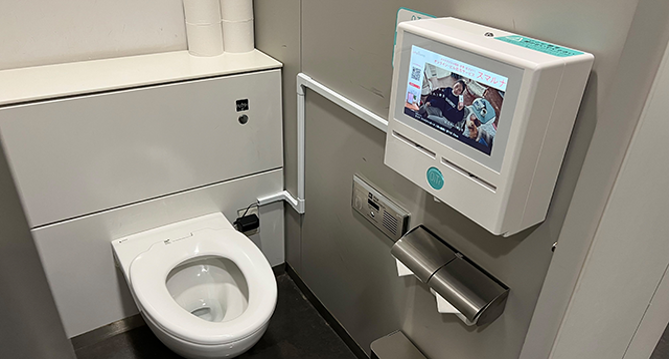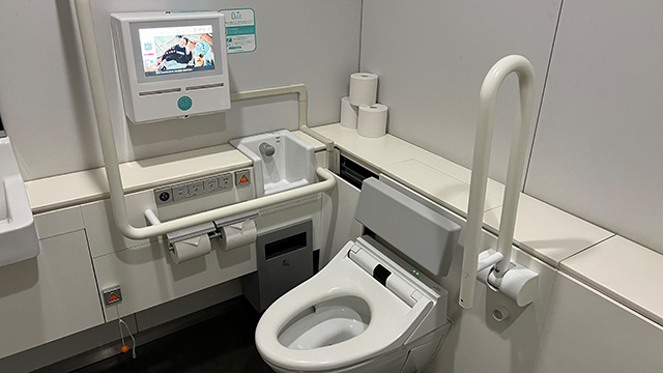Don’t Handle Worries on Your Body Alone — “Breeze Project” for Supporting Women’s Health(1/2)
Female Students Suffering from Financial and Physical Problems
How much do you spend on maintaining your health? Hospital bills, supplements, gym fees, the time associated with it, etc. Besides, food, toilet paper, and sanitary products are essential to women’s daily lives. However, in recent years, women’s poverty has become a topic of discussion, with many women, especially indigent female students, having difficulty purchasing sanitary products.
About Breeze Project
In 2021, the Keio University Office for Equity, Diversity, and Inclusion launched the “Breeze Project” to provide substantial support for female students suffering physically while they go through an economically challenging time. The project is characterized by its comprehensive support, including the regular distribution of free sanitary pads to undergraduate and graduate students, the installation of “OiTr dispensers” in private women’s restrooms on each campus, and the holding of lectures on body issues.

a series of initiatives in the “Breeze Project”.
Keio University Office for Equity, Diversity, and Inclusion is an organization at Keio University, established in April 2018. Its purpose is to take the initiative to form a society where people live in cooperation with each other through projects related to work-life balance, barrier-free access, and diversity. The Breeze Project was launched to provide a series of support for women’s bodies, which have not received much attention until now. We, the mitacampus crew, had an interview with Ms. Kuroda, Mr. Nakamine, and Ms. Uzawa, who are in charge of the project.

the interview was held online (January 18th, 2022)
Action to be Taken to Improve the Program’s Publicity
At first, the organization distributed sanitary pads to those who had applied in advance. On the first day of the application period, the project received the full quota of 500 applicants. When the distribution of the sanitary pads began, a questionnaire was filled by the applicants. Some mentioned, “I appreciate the distribution, but I would be happier if sanitary pads were stocked in each restroom.” While researching on the Internet, some of the organizers found a service called “OiTr” (a dispenser that provides sanitary pads free of charge) and decided to install them on every campus of the university. At one campus, students asked the administrative office to install OiTr. “I felt we made the right decision,” said Mr. Nakamine. The project does more than distribute sanitary pads. To provide students with knowledge about their bodies, lectures on menopause as well as menstruation are held, and a body consultation service has been set up on campus so that people can feel free to consult a doctor.
The response from the applicants to the series of initiatives was very strong and specific. Ms. Kuroda realized that “everyone has various worries and vague anxieties in their body.”
While the response from the students who made use of this opportunity was quite positive, there is still some room for improvement in terms of the project’s recognition degree in the university. Despite the advertisement on student portals and Twitter, Mr. Nakamine suggests that it might be more effective to spread the word through various media, such as through friends’ networks. In addition, given the inactive participation of men overall, Ms. Kuroda points out the necessity of sharing the message that men do not need to hesitate to know about women’s body issues and also those of themselves.

“OiTr” installed in a women’s restroom in the south building, Mita campus

” OiTr” installed in an accessible restroom in the south building, Mita campus
Try to Find the Hurdles in Your University Life
What kind of action should we take as students to promote the understanding of women’s health issues? “The first step is to think about what kind of initiative would help you lead a healthier and more comfortable life,” says Mr. Nakamine. The “Breeze Project” is now organized based on the ideas brought by the staff members. If you stumble over some problems during your student life, whether big or small, tell them to the organization, and then your suggestions would likely be reflected in the new projects.
In the program on women’s health issues, “ Ask a medical specialist”(「女性のからだ座談会「専門医に聞いてみよう」」), which was held in October 2021, four female students from each campus in Mita, Hiyoshi, Yagami, and Shonan Fujisawa (SFC)shared as panelists how they managed their university life on their period. Everyone agreed that their university life would be more comfortable both physically and mentally if there were more cozy spaces to take a break and relax during menstruation. A student at the SFC campus mentioned that sofas at the SFC campus help her rest and soothe physical pain during the period.
After the program, Ms. Kuroda and Ms. Uzawa themselves visited the SFC campus and checked the sofas and other facilities in the lounge. With six campuses, the daily life environment differs greatly from one campus to another, making female students’ university life during the period different depending on which campus they belong to. To get a deeper grasp of the common hurdles female students face in their university life and to incorporate them into the organization’s project, the organization utilizes regular feedback from students.
“Breeze Project” for Mutual Understanding of Body Issues
A series of lectures of the Breeze Project are principally aimed at bringing together the people, listening to their experiences, and providing specialized knowledge of health issues, regardless of their age or gender, Ms. Uzawa emphasized. The lecture held in October 2021 was designed for students and staff, but quite a few of the participants were parents whose children are currently students. Many of them attended because they wanted to understand what was happening to their children’s bodies from parents’ perspectives. In turn, for the lecture held in January 2022 focusing on menopause, many of the applicants were students, hoping to know in advance about the physical changes that will likely happen to their parents.
Through the Breeze Project, not only students but also staff members of the university can gain expertise and learn about their health issues more deeply. At the same time, they can share their physical and mental concerns. With the appropriate knowledge of their body, not only can they alleviate their own worries, but they can also consider the health conditions of others. This mutual understanding of one’s bodily issues is the foundation of our life.
Written by Sarah Marlowe and Aya Nakao
Edited by Xingyou Li (Lisa)


